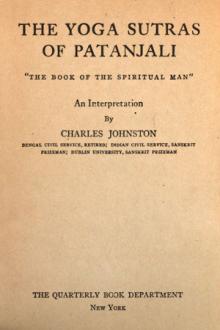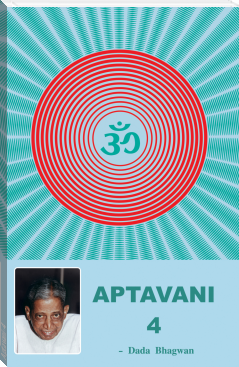The Yoga Sutras of Patanjali - Patañjali (ready to read books txt) 📗

- Author: Patañjali
- Performer: -
Book online «The Yoga Sutras of Patanjali - Patañjali (ready to read books txt) 📗». Author Patañjali
46. Right poise must be firm and without strain. Here we approach a section of the teaching which has manifestly a twofold meaning. The first is physical, and concerns the bodily position of the student, and the regulation of breathing. These things have their direct influence upon soul-life, the life of the spiritual man, since it is always and everywhere true that our study demands a sound mind in a sound body. The present sentence declares that, for work and for meditation, the position of the body must be steady and without strain, in order that the finer currents of life may run their course.
It applies further to the poise of the soul, that fine balance and stability which nothing can shake, where the consciousness rests on the firm foundation of spiritual being. This is indeed the house set upon a rock, which the winds and waves beat upon in vain.
47. Right poise is to be gained by steady and temperate effort, and by setting the heart upon the everlasting.
Here again, there is the twofold meaning, for physical poise is to be gained by steady effort of the muscles, by gradual and wise training, linked with a right understanding of, and relation with, the universal force of gravity. Uprightness of body demands that both these conditions shall be fulfilled.
In like manner the firm and upright poise of the spiritual man is to be gained by steady and continued effort, always guided by wisdom, and by setting the heart on the Eternal, filling the soul with the atmosphere of the spiritual world. Neither is effective without the other. Aspiration without effort brings weakness; effort without aspiration brings a false strength, not resting on enduring things. The two together make for the right poise which sets the spiritual man firmly and steadfastly on his feet.
48 The fruit of right poise is the strength to resist the shocks of infatuation or sorrow.
In the simpler physical sense, which is also coveted by the wording of the original, this sentence means that wise effort establishes such bodily poise that the accidents of life cannot disturb it, as the captain remains steady, though disaster overtake his ship.
But the deeper sense is far more important. The spiritual man, too, must learn to withstand all shocks, to remain steadfast through the perturbations of external things and the storms and whirlwinds of the psychical world. This is the power which is gained by wise, continuous effort, and by filling the spirit with the atmosphere of the Eternal.
49. When this is gained, there follows the right guidance of the life-currents, the control of the incoming and outgoing breath.
It is well understood to-day that most of our maladies come from impure conditions of the blood. It is coming to be understood that right breathing, right oxygenation, will do very much to keep the blood clean and pure. Therefore a right knowledge of breathing is a part of the science of life.
But the deeper meaning is, that the spiritual man, when he has gained poise through right effort and aspiration, can stand firm, and guide the currents of his life, both the incoming current of events, and the outgoing current of his acts.
Exactly the same symbolism is used in the saying: Not that which goeth into the mouth defileth a man; but that which cometh out of the mouth, this defileth a man…. Those things which proceed out of the mouth come forth from the heart … out of the heart proceed evil thoughts, murders, uncleanness, thefts, false witness, blasphemies. Therefore the first step in purification is to keep the Commandments.
50. The life-current is either outward, or inward, or balanced; it is regulated according to place, time, number; it is prolonged and subtle. The technical, physical side of this has its value. In the breath, there should be right inbreathing, followed by the period of pause, when the air comes into contact with the blood, and this again followed by right outbreathing, even, steady, silent. Further, the lungs should be evenly filled; many maladies may arise from the neglect and consequent weakening of some region of the lungs. And the number of breaths is so important, so closely related to health, that every nurse’s chart records it.
But the deeper meaning is concerned with the currents of life; with that which goeth into and cometh out of the heart.
51. The fourth degree transcends external and internal objects.
The inner meaning seems to be that, in addition to the three degrees of control already described, control, that is, over the incoming current of life, over the outgoing current, and over the condition of pause or quiesence, there is a fourth degree of control, which holds in complete mastery both the outer passage of events and the inner currents of thoughts and emotions; a condition of perfect poise and stability in the midst of the flux of things outward and inward.
52. Thereby is worn away the veil which covers up the light.
The veil is the psychic nature, the web of emotions, desires, argumentative trains of thought, which cover up and obscure the truth by absorbing the entire attention and keeping the consciousness in the psychic realm. When hopes and fears are reckoned at their true worth, in comparison with lasting possessions of the Soul; when the outer reflections of things have ceased to distract us from inner realities; when argumentative-thought no longer entangles us, but yields its place to flashing intuition, the certainty which springs from within; then is the veil worn away, the consciousness is drawn from the psychical to the spiritual, from the temporal to the Eternal. Then is the light unveiled.
53. Thence comes the mind’s power to hold itself in the light.
It has been well said, that what we most need is the faculty of spiritual attention; and in the same direction of thought it has been eloquently declared that prayer does not consist in our catching God’s attention, but rather in our allowing God to hold our attention.
The vital matter is, that we need to disentangle our consciousness from the noisy and perturbed thraldom of the psychical, and to come to consciousness as the spiritual man. This we must do, first, by purification, through the Commandments and the Rules; and, second, through the faculty of spiritual attention, by steadily heeding endless fine intimations of the spiritual power within us, and by intending our consciousness thereto; thus by degrees transferring the centre of consciousness from the psychical to the spiritual. It is a question, first, of love, and then of attention.
54. The right Withdrawal is the disengaging of the powers from entanglement in outer things, as the psychic nature has been withdrawn and stilled.
To understand this, let us reverse the process, and think of the one consciousness, centred in the Soul, gradually expanding and taking on the form of the different perceptive powers; the one will, at the same time, differentiating itself into the varied powers of action.
Now let us imagine this to be reversed, so that the spiritual force, which has gone into the differentiated powers, is once more gathered together into the inner power of intuition and spiritual will, taking on that unity which is the hall-mark of spiritual things, as diversity is the seal of material things.
It is all a matter of love for the quality of spiritual consciousness, as against psychical consciousness, of love and attention. For where the heart is, there will the treasure be also; where the consciousness is, there will the vesture with its powers be developed.
55. Thereupon follows perfect mastery over the powers.
When the spiritual condition which we have described is reached, with its purity, poise, and illuminated vision, the spiritual man is coming into his inheritance, and gaining complete mastery of his powers.
Indeed, much of the struggle to keep the Commandments and the Rules has been paving the way for this mastery; through this very struggle and sacrifice the mastery has become possible; just as, to use St. Paul’s simile, the athlete gains the mastery in the contest and the race through the sacrifice of his long and arduous training. Thus he gains the crown.
The third book of the Sutras is the Book of Spiritual Powers. In considering these spiritual powers, two things must be understood and kept in memory. The first of these is this: These spiritual powers can only be gained when the development described in the first and second books has been measurably attained; when the Commandments have been kept, the Rules faithfully followed, and the experiences which are described have been passed through. For only after this is the spiritual man so far grown, so far disentangled from the psychical bandages and veils which have confined and blinded him, that he can use his proper powers and faculties. For this is the secret of all spiritual powers: they are in no sense an abnormal or supernatural overgrowth upon the material man, but are rather the powers and faculties inherent in the spiritual man, entirely natural to him, and coming naturally into activity, as the spiritual man is disentangled and liberated from psychical bondage, through keeping the Commandments and Rules already set forth.
As the personal man is the limitation and inversion of the spiritual man, all his faculties and powers are inversions of the powers of the spiritual man. In a single phrase, his self seeking is the inversion of the Self-seeking which is the very being of the spiritual man: the ceaseless search after the divine and august Self of all beings. This inversion is corrected by keeping the Commandments and Rules, and gradually, as the inversion is overcome, the spiritual man is extricated, and comes into possession and free exercise of his powers. The spiritual powers, therefore, are the powers of the grown and liberated spiritual man. They can only be developed and used as the spiritual man grows and attains liberation through obedience. This is the first thing to be kept in mind, in all that is said of spiritual powers in the third and fourth books of the Sutras. The second thing to be understood and kept in mind is this:
Just as our modern sages have discerned and taught that all matter is ultimately one and eternal, definitely related throughout the whole wide universe; just as they have discerned and taught that all force is one and eternal, so coordinated throughout the whole universe that whatever affects any atom measurably affects the whole boundless realm of matter and force, to the most distant star or nebula on the dim confines of space; so the ancient sages had discerned and taught that all consciousness is one, immortal, indivisible, infinite; so finely correlated and continuous that whatever is perceived by any consciousness is, whether actually or potentially, within the reach of all consciousness, and therefore within the reach of any consciousness. This has been well expressed by saying that all souls are fundamentally one with the Oversoul; that the Son of God, and all Sons of God, are fundamentally one with the Father. When the consciousness is cleared of psychic bonds and veils, when the spiritual man is able to stand, to see, then this superb law comes into effect: whatever is within the knowledge of any consciousness, and this includes the whole infinite universe, is within his reach, and may, if he wills, be made a part of his consciousness. This he may attain through his fundamental unity with the Oversoul, by raising himself toward the consciousness above him, and drawing on its resources. The Son, if he would work miracles, whether of perception or of action, must come often into the presence of the Father. This is the birthright of





Comments (0)